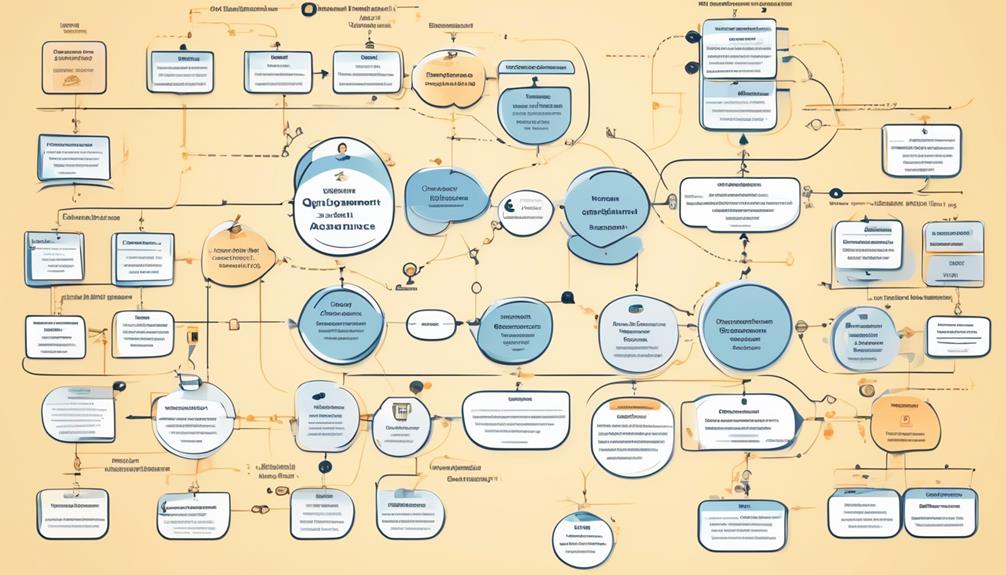Are you losing sleep over concerns about the security, efficiency, and compliance of your software? Software auditing is crucial for addressing these worries by ensuring that your company’s software meets industry standards and your specific needs. Whether it’s identifying security vulnerabilities, ensuring compliance with licensing agreements, or improving performance, software auditing provides valuable insights and suggestions.
At [Your Company Name], we understand the importance of software auditing in today’s digital landscape. With our expertise in IT auditing and software compliance, we can help you navigate the complexities of software audits and improve the overall quality of your software products.
In this article, we will explore the essentials of software auditing, including the software audit process, it audit software tools, and the benefits of regular software audits. We will also discuss when and how to conduct a software audit, the importance of verifying licensing compliance, and the role of professional vendors in software auditing.
Key Takeaways:
- Software auditing is essential to ensure the security, efficiency, and compliance of your software products.
- Regular software audits can help identify and address vulnerabilities, optimize performance, and reduce unnecessary expenses.
- Verifying licensing compliance is crucial to avoid legal and financial consequences.
- Professional vendors can provide unbiased reports and recommendations for thorough software audits.
- Continuous software auditing is necessary to maintain the integrity of your software and protect your business.
What is Software Auditing?
Software auditing is an essential process that ensures compliance with industry standards and organizational requirements. It involves conducting an independent review of software products, processes, and systems. The primary goal of software auditing is to enhance the quality and effectiveness of the software by identifying any issues or areas of improvement.
Software audits examine the software development life cycle (SDLC), including the planning, development, testing, deployment, and maintenance phases. By thoroughly evaluating each stage of the SDLC, software auditors can identify potential risks, errors, or vulnerabilities.
Software audits can be conducted internally or externally, depending on the needs of the organization. Internal audits are typically more frequent and performed by internal teams, while external audits are conducted by independent third-party auditors. Both types of audits provide valuable insights into the software’s compliance with licensing agreements, security protocols, best practices, and industry regulations.
During the software audit process, auditors use various tools, techniques, and methodologies to examine the software’s functionality, performance, security, and code quality. They analyze documentation, inspect code, review system configurations, and conduct interviews with stakeholders. This comprehensive assessment enables auditors to identify any potential risks, areas of non-compliance, and opportunities for improvement.
Software auditing is a critical process that helps organizations maintain software security, compliance, and efficiency. It provides valuable insights into the software’s strengths, weaknesses, and areas for enhancement. By conducting regular software audits, businesses can ensure the reliability and effectiveness of their software products.
Through software auditing, organizations can:
- Identify non-compliance: Software audits help identify any non-compliance issues, such as unauthorized software usage or violations of licensing agreements.
- Enhance security: Auditors assess the software’s security measures to identify vulnerabilities and recommend improvements to prevent data breaches and unauthorized access.
- Optimize performance: By analyzing the software’s performance metrics, auditors can identify bottlenecks, inefficiencies, and areas for optimization to enhance overall performance.
- Ensure quality: Audits assess the software’s code quality, adherence to coding standards, and use of best practices, helping identify areas for improvement and enhancing overall software quality.
- Identify cost-saving opportunities: Software audits identify unused or underutilized software licenses, enabling organizations to optimize their licensing costs.
Overall, software auditing plays a crucial role in ensuring that organizations’ software meets industry standards, regulatory requirements, and user expectations. Regular audits help businesses protect their software investments, enhance security, mitigate risks, and optimize overall software performance.
| Software Auditing Benefits | Key Takeaways |
|---|---|
| Identify non-compliance issues | Regular software audits ensure compliance with licensing agreements and industry regulations, reducing the risk of legal consequences. |
| Enhance security | Software audits help identify vulnerabilities, strengthen security measures, and protect against data breaches. |
| Optimize performance | Audits identify bottlenecks, inefficiencies, and areas for improvement to enhance software performance. |
| Ensure quality | Software audits assess code quality, adherence to best practices, and identify areas for improvement to enhance overall software quality. |
| Identify cost-saving opportunities | Audits identify unused or underutilized software licenses, optimizing licensing costs and reducing unnecessary expenses. |
The Benefits of Software Auditing
Software auditing offers numerous advantages for businesses seeking to enhance the security, efficiency, and compliance of their software products. By conducting regular audits and utilizing software audit tools, reports, and checklists, organizations can unlock significant benefits that positively impact their overall operations.
- Identification and removal of unused tools: Through software auditing, businesses can identify and eliminate unnecessary or underutilized software tools. This streamlines their software inventory, reduces licensing and subscription expenses, and optimizes resource allocation.
- Cost savings and avoidance of legal issues: By ensuring compliance with licensing agreements and industry standards, software audits help businesses avoid costly legal disputes. It also enables them to minimize the risk of penalties that may arise from non-compliance.
- Prioritization of updates and improvements: Software audits provide insights into the current state of software products, allowing organizations to prioritize updates and improvements. Regular audits help address potential security vulnerabilities, optimize performance, and boost overall software quality.
- Enhanced software performance: Through comprehensive evaluations and assessments, software audits identify areas for improvement. By implementing the necessary changes, businesses can optimize software performance, resulting in increased efficiency and user satisfaction.
Regular software audits play a vital role in ensuring that software remains secure, efficient, and compliant over time. Such audits contribute to long-term cost savings and reduce the risk of legal and financial repercussions. By leveraging software audit tools, reports, and checklists, businesses can conduct thorough audits and continuously improve the quality of their software products.
When Should You Conduct a Software Audit?
Software audits are an essential part of maintaining the integrity of your software products. Conducting regular audits helps identify and address potential issues, ensure compliance with industry standards, and optimize software performance. But when is the best time to conduct a software audit?
Generally, software audits can be carried out at any stage of the software development life cycle (SDLC). However, it is recommended to perform audits during the development or testing phase. This allows for early detection and resolution of any issues, preventing them from escalating and impacting the final product.
Additionally, it is crucial to conduct situational audits when specific events or changes occur. These include:
- The software has not been updated for a significant period
- The software’s performance has slowed down
- There has been a data breach or other security risks
- The software has stopped working properly
- There is a need to reduce maintenance costs
- The in-house team lacks time and expertise
- Before deploying the software to fleet services or purchasing a new software product
In these situations, both internal and external software audits are essential. Internal audits allow you to assess the software’s internal processes, while external audits provide an objective evaluation by an independent third party.
By conducting software audits at the right time and in the right situations, you can ensure that your software remains secure, compliant, and efficient, saving your business from potential risks and financial consequences.
Quote:
We understand that conducting software audits can be a challenging task. That’s why our team of experts is here to guide you through the process and help you achieve software excellence.
The Process of Software Auditing
When it comes to software auditing, a well-defined and structured process is essential. By following a methodical approach, organizations can ensure comprehensive audits that identify potential issues and provide valuable recommendations for improvement.
The process of software auditing typically involves the following steps:
- Planning the Audit: This step involves determining the objectives, scope, and timeline of the audit. It is important to define what aspects of the software will be examined, such as code, infrastructure, and security.
- Selecting the Audit Team: A team of qualified professionals should be chosen to conduct the audit. These individuals should have expertise in software development, auditing methodologies, and relevant industry standards.
- Determining the Audit Methodology: The audit methodology should align with industry best practices and standards. It may include techniques such as code auditing, infrastructure auditing, and security auditing, each focusing on different aspects of the software.
- Conducting the Audit: This is the phase where the actual audit takes place. The audit team thoroughly reviews the software, examining its code for bugs and vulnerabilities, evaluating infrastructure performance, and testing security measures.
The software audit process is designed to uncover any potential issues that could impact the software’s functionality, security, and compliance. By following a systematic approach, organizations can gain valuable insights into their software systems and implement necessary improvements.
Code Auditing
One of the key aspects of software auditing is code auditing. It involves a comprehensive review of the software’s source code to identify potential bugs, vulnerabilities, and areas for improvement. By analyzing the code, auditors can assess the quality and maintainability of the software, helping organizations enhance its overall performance.
Infrastructure Audit
In addition to code auditing, an infrastructure audit is another crucial aspect of software auditing. This audit focuses on evaluating the performance of the software’s underlying infrastructure, including hardware, networks, and servers. By assessing the infrastructure, organizations can identify bottlenecks, optimize resource allocation, and ensure that the software operates efficiently.
Security Auditing
Security auditing plays a vital role in the software audit process. It aims to detect potential security threats, vulnerabilities, and weaknesses in the software, ensuring that appropriate measures are in place to protect against unauthorized access, data breaches, and other security risks. Security auditors employ techniques such as penetration testing, vulnerability assessments, and compliance checks to assess the software’s security posture.

By following a thorough and comprehensive software audit process, organizations can identify areas of improvement, enhance the performance and security of their software, and ensure compliance with industry standards and regulations.
Verifying Licensing Compliance
Verifying licensing compliance is an essential part of software auditing. Ensuring that our software is used in accordance with licensing agreements and industry standards is crucial for maintaining legal and financial security. Compliance audits play a vital role in identifying any non-compliance issues and providing appropriate solutions to ensure proper licensing and legal compliance.
At [Company Name], we understand the significance of maintaining proper license compliance. By conducting thorough software license audits, we help businesses avoid potential legal and financial consequences. Our audits meticulously assess whether the software is being used within the boundaries defined by licensing agreements and industry regulations.
The Importance of Compliance Audits
A compliance audit enables us to identify any licensing discrepancies, unauthorized usage, or improper redistribution of software. By evaluating the licensing terms, entitlements, and usage patterns, we unearth any deviations from the compliance requirements.
We believe that compliance audits are our responsibility to both our clients and the software industry as a whole. It is crucial for software owners to adhere to licensing agreements and industry standards to protect intellectual property rights, foster fair competition, and maintain a level playing field.
Through compliance audits, we not only ensure that businesses are using the software within the legal boundaries but also help them optimize their software utilization. By identifying unused licenses or inefficient usage, we assist businesses in boosting cost savings and maximizing their return on investment.
Our Compliance Audit Process
When conducting compliance audits, we employ a comprehensive approach to ensure accuracy and reliability. Our process includes:
- Thoroughly reviewing licensing agreements and entitlements
- Assessing software deployment and usage
- Verifying compliance with industry regulations and standards
- Identifying any unauthorized or non-compliant usage
- Recommendations for resolving compliance issues
Our experienced audit team evaluates the intricacies of licensing agreements, the usage patterns, and the specific needs of your business to provide tailored recommendations for ensuring compliance.
The Benefits of Compliance
Verifying licensing compliance brings numerous benefits to businesses:
- Protects against potential legal and financial consequences
- Fosters good relationships with software vendors and licensors
- Ensures proper utilization of software licenses
- Identifies opportunities for cost savings and efficiency improvements
- Helps maintain industry standards and professional ethics
By prioritizing licensing compliance, businesses can safeguard their operations and reputation, while also reaping the rewards of optimized software usage.
Monitoring for Quality Assurance
As part of the software auditing process, monitoring for quality assurance plays a critical role in ensuring that the software meets established quality standards. During quality assurance audits, we conduct a thorough examination of the software to identify any issues or weaknesses that may exist. By doing so, we can provide recommendations for improvement, ensuring that the software is of high quality and meets the expectations of its users.
Quality assurance audits are essential to guarantee that the software performs optimally, is reliable, and meets the needs of its intended users. By closely monitoring the software’s functionality, performance, and user experience, we can identify areas that require attention and take proactive measures to address them.
During the quality assurance audit, we pay attention to various factors, including:
- Performance: We assess the software’s speed, responsiveness, and stability to ensure efficient and smooth operation.
- Functionality: We verify that all features and functionalities of the software work as intended and fulfill the requirements defined during the development process.
- User Experience: We evaluate the intuitive nature of the software’s user interface, ensuring that it is user-friendly and intuitive.
- Compatibility: We test the software’s compatibility with different platforms, devices, and operating systems to ensure seamless operation across various environments.
By thoroughly monitoring the quality of the software, we can detect any potential issues early on and address them promptly. This helps prevent any negative impact on user experience and minimizes the risk of software failures or malfunctions that could disrupt business operations.
Monitoring for quality assurance is a crucial part of software auditing. By closely examining the software’s performance, functionality, user experience, and compatibility, we can ensure that it meets our established quality standards and delivers a seamless experience for its users.”
– Software Audit Team
In conclusion, quality assurance audits are vital for maintaining the high quality and optimal performance of software. By continuously monitoring the software and implementing improvements based on our findings, we can ensure that it meets industry standards and exceeds user expectations.
Earlier, we mentioned the importance of software code auditing, infrastructure audit, and security auditing as part of the broader software auditing process. In the next sections, we will delve deeper into these specific aspects to provide a comprehensive understanding of software auditing.

Compliance with Industry Standards
Compliance with industry standards is a critical aspect of software auditing. Every industry has its own set of regulations and requirements that software must adhere to. Conducting compliance audits ensures that software products meet these standards and regulations, minimizing the risk of legal and financial repercussions. Regular software audits are essential to ensure compliance with industry standards.
At Our Software Auditing Solutions, we understand the importance of compliance for businesses operating in various industries. Our team of experts specializes in conducting software compliance audits, evaluating the software’s adherence to the specific regulatory requirements of each industry. By partnering with us, you can rest assured that your software will meet industry standards, reducing the risk of non-compliance.
The Benefits of Compliance Audits
Compliance audits offer several benefits to businesses:
- Legal and Financial Protection: By ensuring compliance with industry standards, businesses can avoid costly penalties and legal issues.
- Enhanced Reputation: Compliant software demonstrates a commitment to maintaining high-quality standards, fostering trust among customers and stakeholders.
- Data Security: Compliance audits evaluate software security measures, reducing the risk of data breaches and unauthorized access.
- Competitive Advantage: Compliance with industry standards can give businesses a competitive edge, demonstrating their commitment to excellence.
- Streamlined Operations: Compliance audits identify areas of improvement, helping businesses streamline their software processes and operations.
By conducting regular compliance audits, businesses can ensure that their software meets industry regulations and standards, enabling them to operate smoothly within their respective industries.
| Software Compliance Audit Checklist |
|---|
| Conduct a comprehensive review of the software’s compliance requirements. |
| Identify and assess potential compliance gaps or risks. |
| Evaluate the software’s adherence to industry-specific regulations and standards. |
| Review documentation, licenses, and contracts related to the software. |
| Assess the software’s data security measures and privacy controls. |
| Create an action plan to address any non-compliance issues. |
| Regularly monitor and update the software’s compliance status. |
“Compliance is not just about ticking boxes; it is about maintaining the integrity of your software and safeguarding your business.” – Our Software Auditing Solutions
Conducting a Software Audit
To successfully conduct a software audit, proper planning and organization are essential. Here are the key steps to follow:
- 1. Plan the Audit: Determine the scope and objectives of the audit. Identify which areas of your software infrastructure and processes will be assessed.
- 2. Define the Audit Team: Assemble a team of experts with knowledge in software development and auditing. Their expertise will ensure a comprehensive and accurate audit.
- 3. Gather Relevant Data: Collect all necessary information related to your software systems, including hardware and software inventory, user data, entitlement data, and documentation of licensing agreements.
- 4. Develop a Software Audit Checklist: Create a checklist that outlines all the steps and requirements for the audit. This checklist will serve as your guide to ensure no important aspects are overlooked.
During the software audit, it is crucial to evaluate your software’s compliance with licensing agreements and industry standards. Additionally, consider conducting a thorough assessment of the security measures, performance, and functionality of your software.
“A comprehensive software audit allows businesses to uncover vulnerabilities, address non-compliance issues, and identify areas for improvement.”
By conducting a software audit using the defined steps and checklist, you can ensure that your software aligns with industry standards, functions optimally, and meets the needs of your organization. It will also help you identify potential risks and take proactive measures to mitigate them.
With a carefully executed software audit, you can confidently make informed decisions about your software infrastructure and maintain compliance with licensing agreements and industry regulations.
The Importance of Continuous Software Auditing
Continuous software auditing is crucial for businesses to ensure the ongoing security, compliance, and efficiency of their software systems. By regularly reviewing and evaluating the software, organizations can proactively identify and address any issues or weaknesses before they become major problems. This continuous process of software auditing helps maintain the integrity and optimal functioning of the software, saving businesses money in the long run while avoiding unnecessary expenses and legal complications.
Regular software audits serve as a preventive measure, enabling businesses to detect and rectify potential vulnerabilities, non-compliance with licensing agreements, or deviations from industry standards. By conducting audits at regular intervals, we can ensure that software licenses are up-to-date, ensuring compliance with licensing agreements and reducing the risk of legal consequences.
In addition to detecting and resolving issues, continuous software auditing also allows businesses to keep their software up-to-date with the latest advancements and industry best practices. By staying current with software updates and upgrades, organizations can leverage new features, enhancements, and security patches to improve their software’s performance, reliability, and user experience.
Continuous software auditing can be facilitated through the use of automated software audit tools. These tools streamline the audit process, providing valuable insights and reports on the software’s performance, security, and compliance. With the assistance of such tools, businesses can efficiently manage and maintain their software assets, ensuring their continued reliability and competitiveness in the market.
| Benefits of Continuous Software Auditing |
|---|
| 1. Early detection and resolution of software vulnerabilities |
| 2. Ensuring compliance with licensing agreements and industry standards |
| 3. Cost savings by avoiding legal consequences and unnecessary expenses |
| 4. Optimization of software performance and user experience |
| 5. Keeping software up-to-date with the latest advancements |
Continuous software auditing is an ongoing commitment to maintaining the health and efficiency of software systems. By prioritizing regular audits and leveraging the benefits they offer, businesses can safeguard their software assets, protect against potential risks, and ensure optimal performance and compliance.
The Role of a Professional Vendor in Software Auditing
Professional vendors play a crucial role in the software auditing process. With their expertise in software development and auditing, they provide valuable insights and unbiased assessments. In particular, third-party software audits offer an external and objective perspective, ensuring the highest level of scrutiny. When businesses engage professional vendors for software audits, they benefit from a comprehensive and meticulous evaluation.
Professional vendors have a deep understanding of industry standards and compliance requirements. They possess the knowledge and experience to identify areas of improvement and suggest effective strategies for optimization. By leveraging their expertise, businesses can conduct thorough audits that encompass all aspects of the software ecosystem.
When it comes to licensing agreements and industry standards, professional vendors ensure compliance. They carefully assess licensing agreements to verify that software usage adheres to the established guidelines. This meticulous approach prevents legal and financial consequences that can arise from non-compliance.
Moreover, professional vendors offer an unbiased perspective. Their independent audits provide an objective assessment of the software’s security, efficiency, and compliance. This third-party validation instills confidence in both businesses and stakeholders, helping them make informed decisions based on trustworthy audit reports and recommendations.
Overall, professional vendors are valuable partners in the software auditing process. They bring expertise, objectivity, and industry knowledge to ensure comprehensive assessments and regulatory compliance. By engaging professional vendors, businesses can optimize their software, reduce risks, and demonstrate their commitment to maintaining the highest standards of software quality.
Conclusion
Software auditing plays a crucial role in ensuring the security, efficiency, and compliance of software products for businesses. By conducting regular internal and external audits, organizations can identify and address potential issues, improve software performance, and ultimately save money in the long run. Verifying licensing compliance, monitoring for quality assurance, and complying with industry standards are essential practices that help maintain the integrity of software and protect businesses from legal and financial consequences.
To enhance the effectiveness of software audits, working with professional vendors can be invaluable. These experts have the necessary knowledge in software development and auditing, enabling them to provide unbiased reports and recommendations. Partnering with professional vendors ensures a thorough evaluation of software products, identifies areas for improvement, and helps businesses maintain compliance with licensing agreements and industry standards.
In conclusion, software auditing is not just a proactive measure to detect issues, but also a strategic practice that promotes long-term success. By prioritizing software audits and embracing the proactive approach, businesses can secure their software products, optimize their performance, and remain compliant with industry standards. Through collaboration with professional vendors, organizations can leverage expertise and unbiased insights to drive continuous improvement and confidently navigate the software audit process.
FAQ
What is software auditing?
Software auditing is an independent review of software products, processes, and systems to ensure they meet industry standards and organizational requirements.
What are the benefits of software auditing?
The benefits of software auditing include identifying and removing unused tools, reducing expenses on licenses and subscriptions, avoiding legal issues, prioritizing updates, and improving software performance.
When should I conduct a software audit?
Software audits can be conducted when there are changes in business requirements, regulatory environment, or technology landscape, or when there is a need to reduce maintenance costs, improve performance, or ensure compliance.
What is the process of software auditing?
The process of software auditing involves planning the audit, defining the scope and objectives, selecting the audit team, determining the audit methodology, and conducting the audit.
How can I verify licensing compliance through software auditing?
Verifying licensing compliance is an important aspect of software auditing. Compliance audits help identify any non-compliance issues and recommend solutions to ensure proper licensing and legal compliance.
How does software auditing help with quality assurance?
Software auditing includes monitoring for quality assurance. It involves conducting a thorough examination of the software to ensure that it meets established quality standards.
Why is compliance with industry standards important in software auditing?
Compliance with industry standards is essential to ensure that software products comply with regulations and reduce the risk of legal and financial consequences.
What steps should I follow to conduct a software audit?
To conduct a software audit, it is important to plan the audit, define the scope and objectives, select the audit team, and gather relevant data. A software audit checklist can be helpful in ensuring that all necessary steps are followed.
Why is continuous software auditing important?
Continuous software auditing is essential to ensure that software remains secure, up-to-date, and compliant. Regular audits help identify and address any issues or weaknesses in the software before they become major problems.
What is the role of a professional vendor in software auditing?
Professional vendors can play a crucial role in conducting software audits. They have expertise in software development and auditing and can provide unbiased reports and recommendations.
At the helm of our content team is Amelia, our esteemed Editor-in-Chief. Her extensive background in technical writing is matched by her deep-seated passion for technology. Amelia has a remarkable ability to distill complex technical concepts into content that is not only clear and engaging but also easily accessible to a wide range of audiences. Her commitment to maintaining high-quality standards and her keen understanding of what our audience seeks are what make her an invaluable leader at EarnQA. Under Amelia’s stewardship, our content does more than just educate; it inspires and sets new benchmarks in the realm of QA education.










